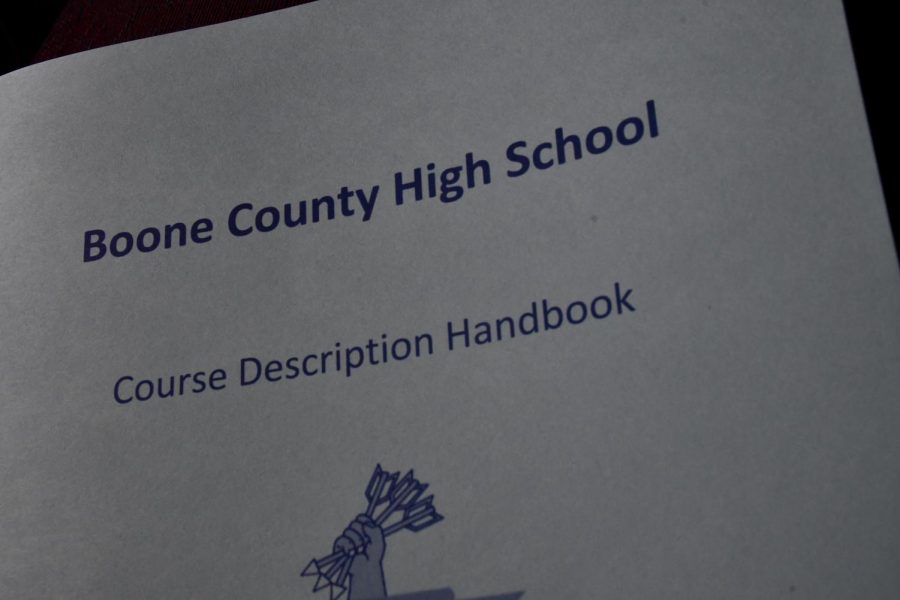Boone replacing most honors classes with unweighted ‘accelerated’ courses
Leaders expect changes will push more kids to enroll in AP, dual enrollment classes
March 30, 2021
Boone students are scheduling their classes for the next school year, and they may have noticed some major changes to the class offerings.
These changes have come from recent decisions by the Site Based Decision Making Council to modify the course description book for Boone, such as replacing most honors classes with new “accelerated” classes.
Any honors classes which remain–such as Chemistry Honors–were classes that the College Board suggested as prerequisites for Advanced Placement classes that the school offers.
Students who participate in these accelerated courses will not see any bump to their grade point averages. Entry into these classes is based on the score they obtained in the College Equipped Readiness Tool, or CERT.
Advanced Placement and dual enrollment classes will still be weighted with a GPA bump but not the honors/accelerated classes, counselor Dustin Herald confirmed.
Principal Tim Schlotman explained that he believes the schedule modifications will help improve student performance.

“These changes should increase rigorous course opportunities for all of our students and will hopefully increase Advanced Placement opportunities for our students,” Schlotman said.
He also said that dropping weighted honors classes “will not negatively impact college scholarship opportunities.”
For example, Schlotman said that this change should not affect Kentucky Educational Excellence Scholarships (KEES), which is automatically awarded to college-bound students based on GPA.
“KEES scholarship money is based on a 4.0 grading scale and does not account for weighted GPAs, so it will have no impact on KEES scholarship money,” he said.
So why will students participating in accelerated classes not see a GPA bump?
“Statistical data from ACT indicates that BCHS has inflated GPA’s,” Schlotman said. “Our students ACT scores don’t match where their GPA says they should be scoring.”
How do some Boone students feel about these changes?Senior Tiffany Hoskins agreed that accelerated classes should get a GPA bump.
“I think only honors classes should get the bumps because they are much harder,” she said.
Students who took honors classes had mixed feelings about continuing to take accelerated classes in the future.
“Instead, I am going to take college classes and AP classes,” junior Sydney Whitford said. “I feel like I will get more out of these classes rather than the accelerated classes.”
“I don’t think I will take ‘accelerated’ classes because there is no benefits to them and you can’t choose to be in them,” junior Kayla Walker said.
Others differed, saying they will continue to take the accelerated classes, but students continue to be divided over the issue.
Changes were also made to the course requirements of the science department. Now, only three science credits will be required for graduation instead of the previous four, which makes Boone consistent with the other schools in the district and the Kentucky Department of Education graduation requirements.
Boone County: Science Investigation (BCSI) was removed as a course and is being replaced by new elective courses for the science department. All freshmen will now take Integrated Science instead of BCSI.
District moving to “standards-based grading”
Not only will students see classes being changed, they can also expect a change to the grading system. The district has been gradually making the switch to “standards based grading.”
Instructional Coach Megan Steffen spoke about the change.
“Standards-based learning (or grading) is simply a stronger focus on where students are with each standard. What that means is each assignment is going to be practice of one of those standards,” she said.
This means that grades that don’t relate to the standards that students learn in class (for example, a binder check or a participation check) will not carry as much if any weight in the final grade since they do not fit the standards of the given class.
Grades will be based on the standards of the class, but will look different than students are probably used to.
Steffen said that students will be scored on a 1-4 scale with 1 being the lowest and 4 being beyond mastery.
When asked about the switch to a more standards-based grading system, one student said “I celebrate it” but others weren’t as thrilled.
“I don’t really like it because it makes certain things harder to do and one assignment can bring your grade way down,” junior Kayla Walker said.
This is not something that will be unique to the Boone County School District. Many districts across the country have been making the transition towards this new system, which can take a couple of years for full implementation.
These grades apparently should provide a better reflection of how well students have mastered the standards in a class.
“As a student, you will know exactly where you stand and exactly what you need to work on to move to the next level,” Steffen said. “Your grades will truly be a reflection of what you know in your head, not just the work you’ve done in class.”
The way students get assessed will change, too. Suppose a student was to fail an assessment, they will be given the opportunity to retake it, so long as they show they’ve practiced and were prepared to redo the content assessment.
The entire district is making the switch to standard based education/grading.
